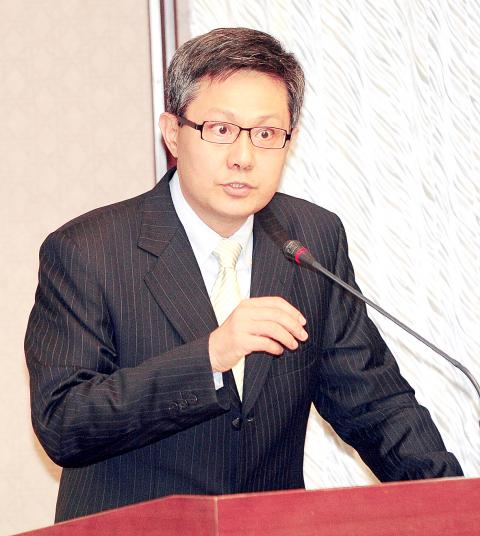Signing a “peace accord” with Beijing could lead to Taiwan being considered part of “China’s internal affairs” and complicate foreign intervention, National Taiwan University College of Law professor Chiang Huang-chih (姜皇池) said yesterday.
The idea of signing a cross-strait peace accord has waxed and waned since the creation of the so-called “1992 consensus” and was most avidly discussed after former president Ma Ying-jeou (馬英九) took office in 2008, Chiang said.
The “1992 consensus” — a term former Mainland Affairs Council chairman Su Chi (蘇起) in 2006 admitted making up in 2000 — refers to a tacit understanding between the Chinese Nationalist Party (KMT) and the Chinese Communist Party (CCP) that both sides of the Taiwan Strait acknowledge there is “one China,” with each side having its own interpretation of what “China” means.

Photo: Chen Chih-chu, Taipei Times
Ma spoke about signing a peace accord in his 2008 inaugural speech and it was in 2016 also adopted by then-KMT chairwoman Hung Hsiu-chu (洪秀柱) in the party’s policy guidelines.
The idea was broached again following a Jan. 2 speech by Chinese President Xi Jinping (習近平) in remarks on Jan. 5 by 21st Century Foundation chairman Kao Yu-jen (高育仁), who said that both sides of the Taiwan Strait should establish a similar historical view, initiate political dialogue and sign an armistice.
Kao is the father-in-law of former New Taipei City mayor Eric Chu (朱立倫), who has declared his intention to run for president next year.
Documents handling peace between nations include peace treaties, ceasefire agreements and armistices, which are considered legally binding in terms of international law, as well as peace accords, Chiang said yesterday.
The precondition to a peace accord is the conclusion of a war, which implies the cessation of hostilities between an internationally recognized government and rebels, or between multiple political entities within a nation, he said.
“As there is neither a state of war nor an armed conflict between Taiwan and China, there is no war to be halted,” meaning the need to sign a cross-strait peace accord is questionable, Chiang said.
Saying that a peace accord should be signed would be an acknowledgement that current or future cross-strait conflicts are a continuation of the Chinese Civil War between the KMT and the CCP, making cross-strait relations “China’s internal affairs” and increasing the difficulty of international intervention, he said.
Cross-strait relations being identified as “China’s internal affairs” would deprive US arms sales to Taiwan of international legitimacy, he added.
Taiwan should carefully consider what message it would be sending to the international community if it agrees to an armistice with China, Chiang said, adding that the nation could lose much if pressured into negotiating under the threat of conflict.

A Chinese aircraft carrier group entered Japan’s economic waters over the weekend, before exiting to conduct drills involving fighter jets, the Japanese Ministry of Defense said yesterday. The Liaoning aircraft carrier, two missile destroyers and one fast combat supply ship sailed about 300km southwest of Japan’s easternmost island of Minamitori on Saturday, a ministry statement said. It was the first time a Chinese aircraft carrier had entered that part of Japan’s exclusive economic zone (EEZ), a ministry spokesman said. “We think the Chinese military is trying to improve its operational capability and ability to conduct operations in distant areas,” the spokesman said. China’s growing

Nine retired generals from Taiwan, Japan and the US have been invited to participate in a tabletop exercise hosted by the Taipei School of Economics and Political Science Foundation tomorrow and Wednesday that simulates a potential Chinese invasion of Taiwan in 2030, the foundation said yesterday. The five retired Taiwanese generals would include retired admiral Lee Hsi-min (李喜明), joined by retired US Navy admiral Michael Mullen and former chief of staff of the Japan Self-Defense Forces general Shigeru Iwasaki, it said. The simulation aims to offer strategic insights into regional security and peace in the Taiwan Strait, it added. Foundation chair Huang Huang-hsiung

PUBLIC WARNING: The two students had been tricked into going to Hong Kong for a ‘high-paying’ job, which sent them to a scam center in Cambodia Police warned the public not to trust job advertisements touting high pay abroad following the return of two college students over the weekend who had been trafficked and forced to work at a cyberscam center in Cambodia. The two victims, surnamed Lee (李), 18, and Lin (林), 19, were interviewed by police after landing in Taiwan on Saturday. Taichung’s Chingshui Police Precinct said in a statement yesterday that the two students are good friends, and Lin had suspended her studies after seeing the ad promising good pay to work in Hong Kong. Lee’s grandfather on Thursday reported to police that Lee had sent

A Chinese ship ran aground in stormy weather in shallow waters off a Philippines-controlled island in the disputed South China Sea, prompting Filipino forces to go on alert, Philippine military officials said yesterday. When Philippine forces assessed that the Chinese fishing vessel appeared to have run aground in the shallows east of Thitu Island (Jhongye Island, 中業島) on Saturday due to bad weather, Philippine military and coast guard personnel deployed to provide help, but later saw that the ship had been extricated, Philippine navy regional spokesperson Ellaine Rose Collado said. No other details were immediately available, including if there were injuries among